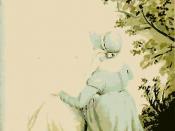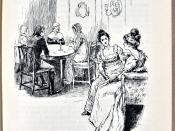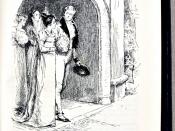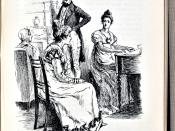"Emma", by Jane Austen is an exemplary novel that deeply analyzes each character through unwinding conflict of plot, while determining the true nature of promising happiness within society. Many characters experience generous amounts of bewilderment that greatly affect their maturity and self identification, involving different stages of sensibility. The way in which characters tackle numerous problems and dilemmas throughout the novel, is a critical factor to their own well-being. However, some characters are being victimized indirectly by others, which often results in the damage of harmony and common sense.
Jane Austen slyly uses the persona of Emma Woodhouse to enhance psychological influence one can set on another, the inferior one, and therefore affect or postpone the sense of true content. Such is the effect of Emma's opinionative deeds as to her attempt at guiding Harriet Smith onto the right road to apparent, greater self-confidence and appreciation. Emma tackles Harriet's own love dilemmas indirectly, through words of conviction and persuasion, which are yet open to modification of Harriet's.
However, this is an antagonistic and cruel move of Emma to pull, because she is aware of her own influence on Harriet, and instead of allowing the girl to think by herself and do as she pleases (maybe even learn on her own mistakes), Emma follows the routes of her own, always correctly indicated thoughts. Throughout these actions, Harriet's sense of happiness is constantly being questioned, because if she was to correspond to her own intuition and instinct, she would be much happier and not as hurt due to love-match failures that she had experienced. If Harriet married Mr. Martin earlier on, and had not tortured herself through admiration of several novel characters which are considered to be out of her league, she would have escaped suffering and contamination of her own ignorance or vanity, supplied by Emma. Many complications caused heartaches and unnecessary mind games throughout the novel, when the outcome of Harriet's situation was as reasonable and pleasing as it could have been from the very beginning.
Emma Woodhouse herself is a self-oriented human being, constantly seeking for everyone's attention and never-ending upraising reputation within the society. Her everlasting desire for more, for better and a desperate need to prove herself keeps Emma from true, fulfilling happiness of own character. She fails to concentrate on little things that could result in quenching satisfaction, and continues to criticize herself for numerous mistakes evoked by Mr. Knightly. Emma's genuine harmony and self-content are, therefore, thought to be rather fake or insisted upon as to her image and picture she presents to others. Emma would never allow for her character to be pessimistic or temperamental, because she clearly knows that those two qualities only push people away, which is the exact opposite of what she would like to do. Her concentration embraces the idea of being perfect, while when next to Mr. Knightly does she become aware of her flaws that influence her self-knowledge. Emma cannot be truly and evidently convivial, because she is always exposed to a problem or conflict that needs to be resolved. It seems as if Emma looks for something to do, something to occupy her mind with, and the more she complicates what she encounters, the more confused and less fulfilled she feels.
Most characters in "Emma" fail to be fulfilled because they are exposed to a range of uncomfortable or redundant situations that, through interest, affect their lives. One of a few exceptions that do not meet this statement is the character of Jane Fairfax, a woman of questionable status that is rather conservative and reserved around other peoples. She does not exactly go with the flow of the society, and watches out for her own factors of happiness. However, due to admiration, love and influence she allowed to be used upon herself, Frank Churchill manages to hurt her in most unreasonable manners. He persuades her into keeping their relationship secret as to his own needs of confidentiality, whilst making flirtatious moves upon Emma to camouflage his dominant feelings for Jane. Jane deserves nothing but the sense of cheerfulness, yet fails to achieve it because of victimization she allowed to take place upon herself. She goes through phases of depression and great discontent, which she most certainly did not ever deserve or call for.





